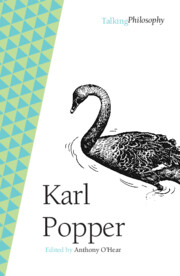Book contents
- Karl Popper
- Talking Philosophy
- Karl Popper
- Copyright page
- Contents
- Contributors
- Preface
- Introduction
- 1 Popper, Science and Rationality
- 2 Popper and Reliabilism
- 3 The Problem of the Empirical Basis
- 4 ‘Revolution in Permanence’: Popper on Theory-Change in Science
- 5 Popper’s Contribution to the Philosophy of Probability
- 6 Propensities and Indeterminism
- 7 Popper on Determinism
- 8 Popper and the Quantum Theory
- 9 The Uses of Karl Popper
- 10 Popper and Darwinism
- 11 Popper and the Scepticism of Evolutionary Epistemology, or, What Were Human Beings Made For?
- 12 Does Popper Explain Historical Explanation?
- 13 The Grounds for Anti-Historicism
- 14 What Use is Popper to a Politician?
- Works of Karl Popper Referred to in the Text
- Index
12 - Does Popper Explain Historical Explanation?
Published online by Cambridge University Press: 25 April 2024
- Karl Popper
- Talking Philosophy
- Karl Popper
- Copyright page
- Contents
- Contributors
- Preface
- Introduction
- 1 Popper, Science and Rationality
- 2 Popper and Reliabilism
- 3 The Problem of the Empirical Basis
- 4 ‘Revolution in Permanence’: Popper on Theory-Change in Science
- 5 Popper’s Contribution to the Philosophy of Probability
- 6 Propensities and Indeterminism
- 7 Popper on Determinism
- 8 Popper and the Quantum Theory
- 9 The Uses of Karl Popper
- 10 Popper and Darwinism
- 11 Popper and the Scepticism of Evolutionary Epistemology, or, What Were Human Beings Made For?
- 12 Does Popper Explain Historical Explanation?
- 13 The Grounds for Anti-Historicism
- 14 What Use is Popper to a Politician?
- Works of Karl Popper Referred to in the Text
- Index
Summary
It is one of Karl Popper’s great distinctions that he has an intense—some would say too intense—awareness of the history of philosophy within which he works. He knows not only its patterns, but also its comedies, and sometimes he plays rhetorically against their grain. He knows, for example, that the drive to consistency tends to turn philosophy into compositions of related doctrines, each seeming to involve the others. Religious belief, for example, tends to go with idealism and free will, religious scepticism with materialism and determinism. Popper does not believe in a religion, was for long some kind of a socialist, and takes his bearings from the philosophy of science. Aha! it seems we have located him. Here is a positivist, a materialist, probably a determinist. But of course he denies he is any of these things. Again, like many modern thinkers, he wants to extend scientific method not only to the social sciences but also to history. So far so familiar, until we discover that he regards nature as no less ‘cloudy’ than human societies.
- Type
- Chapter
- Information
- Karl Popper , pp. 357 - 382Publisher: Cambridge University PressPrint publication year: 2024



